Rosewood Hotel London: Flexible Working and Employee Motivation
VerifiedAdded on 2023/06/10
|13
|2666
|59
Project
AI Summary
This research project explores the impact of flexible working arrangements on employee motivation within the hospitality sector, specifically focusing on a case study of Rosewood Hotel London. The study aims to examine the concept of flexible working, investigate the role of employee motivation, and assess the relationship between the two, ultimately recommending strategies for Rosewood Hotel London. The research acknowledges the challenges faced by the hospitality industry during the COVID-19 pandemic and how flexible working can serve as a motivational tool for employees. It delves into various factors influencing employee motivation, including monetary and non-monetary incentives, and employs qualitative research methods, including secondary data analysis and potential primary data collection through interviews, to provide a comprehensive understanding of the topic. The study also addresses ethical considerations and research limitations, ensuring a credible and valid investigation.
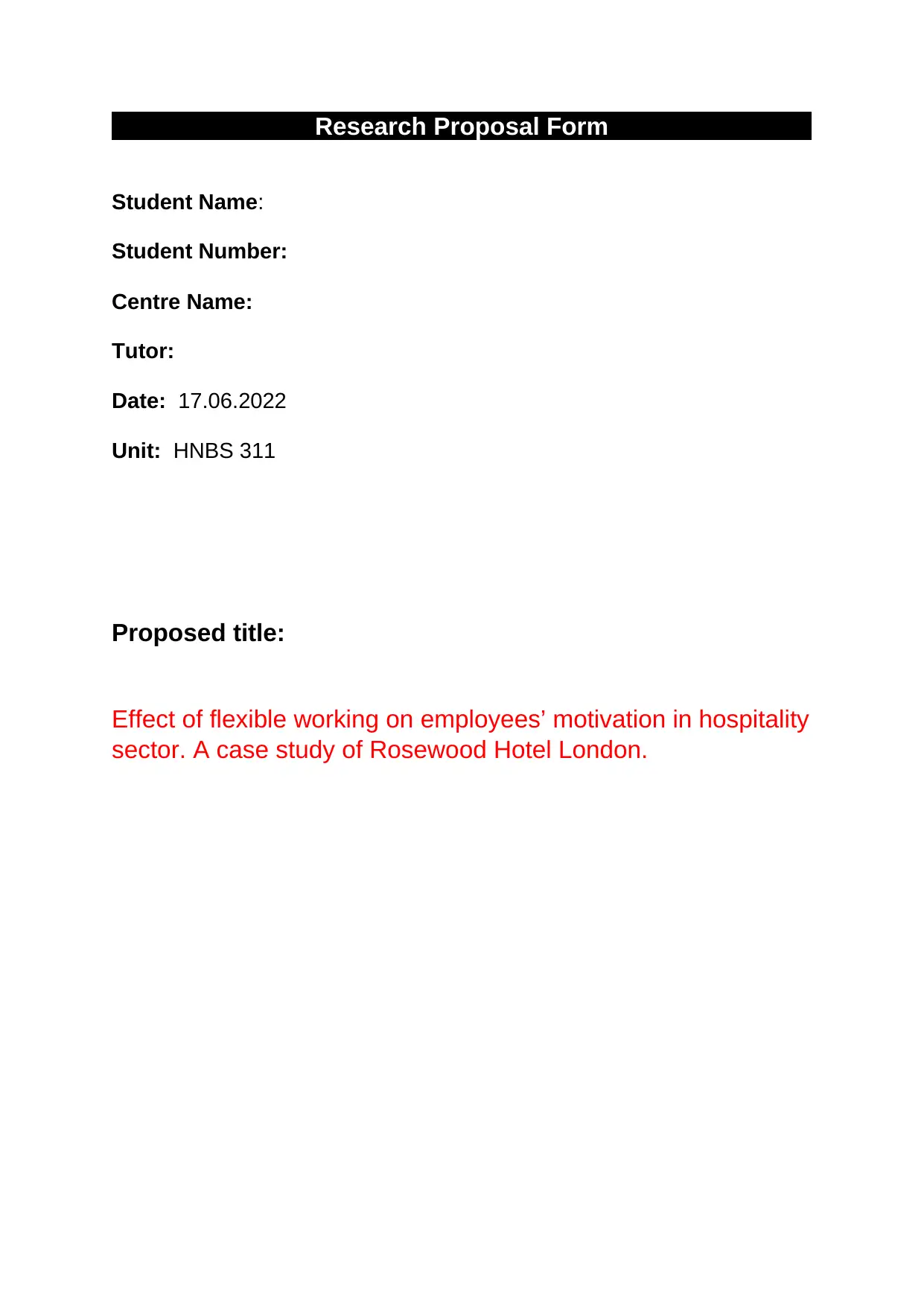
Research Proposal Form
Student Name:
Student Number:
Centre Name:
Tutor:
Date: 17.06.2022
Unit: HNBS 311
Proposed title:
Effect of flexible working on employees’ motivation in hospitality
sector. A case study of Rosewood Hotel London.
Student Name:
Student Number:
Centre Name:
Tutor:
Date: 17.06.2022
Unit: HNBS 311
Proposed title:
Effect of flexible working on employees’ motivation in hospitality
sector. A case study of Rosewood Hotel London.
Paraphrase This Document
Need a fresh take? Get an instant paraphrase of this document with our AI Paraphraser
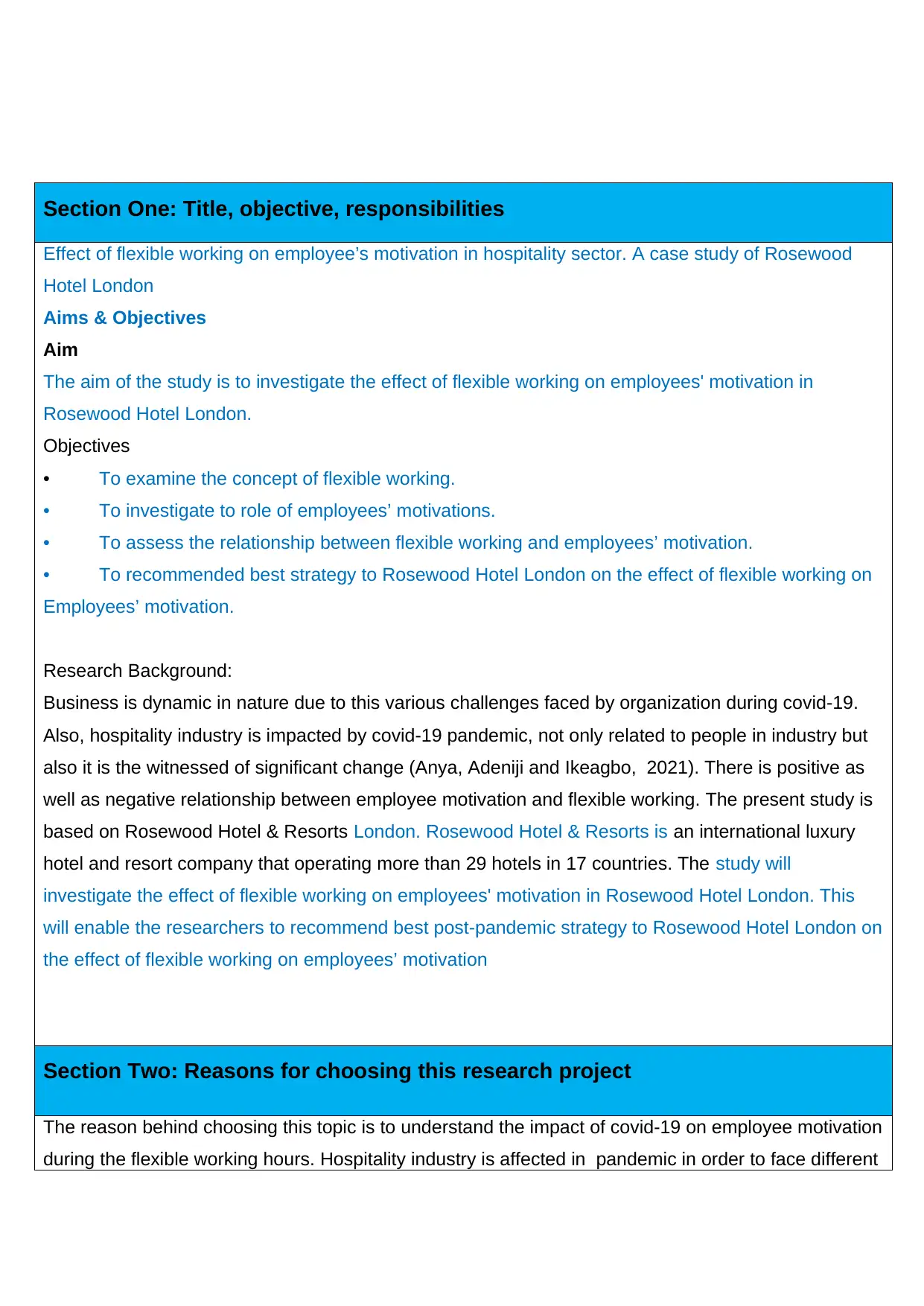
Section One: Title, objective, responsibilities
Effect of flexible working on employee’s motivation in hospitality sector. A case study of Rosewood
Hotel London
Aims & Objectives
Aim
The aim of the study is to investigate the effect of flexible working on employees' motivation in
Rosewood Hotel London.
Objectives
• To examine the concept of flexible working.
• To investigate to role of employees’ motivations.
• To assess the relationship between flexible working and employees’ motivation.
• To recommended best strategy to Rosewood Hotel London on the effect of flexible working on
Employees’ motivation.
Research Background:
Business is dynamic in nature due to this various challenges faced by organization during covid-19.
Also, hospitality industry is impacted by covid-19 pandemic, not only related to people in industry but
also it is the witnessed of significant change (Anya, Adeniji and Ikeagbo, 2021). There is positive as
well as negative relationship between employee motivation and flexible working. The present study is
based on Rosewood Hotel & Resorts London. Rosewood Hotel & Resorts is an international luxury
hotel and resort company that operating more than 29 hotels in 17 countries. The study will
investigate the effect of flexible working on employees' motivation in Rosewood Hotel London. This
will enable the researchers to recommend best post-pandemic strategy to Rosewood Hotel London on
the effect of flexible working on employees’ motivation
Section Two: Reasons for choosing this research project
The reason behind choosing this topic is to understand the impact of covid-19 on employee motivation
during the flexible working hours. Hospitality industry is affected in pandemic in order to face different
Effect of flexible working on employee’s motivation in hospitality sector. A case study of Rosewood
Hotel London
Aims & Objectives
Aim
The aim of the study is to investigate the effect of flexible working on employees' motivation in
Rosewood Hotel London.
Objectives
• To examine the concept of flexible working.
• To investigate to role of employees’ motivations.
• To assess the relationship between flexible working and employees’ motivation.
• To recommended best strategy to Rosewood Hotel London on the effect of flexible working on
Employees’ motivation.
Research Background:
Business is dynamic in nature due to this various challenges faced by organization during covid-19.
Also, hospitality industry is impacted by covid-19 pandemic, not only related to people in industry but
also it is the witnessed of significant change (Anya, Adeniji and Ikeagbo, 2021). There is positive as
well as negative relationship between employee motivation and flexible working. The present study is
based on Rosewood Hotel & Resorts London. Rosewood Hotel & Resorts is an international luxury
hotel and resort company that operating more than 29 hotels in 17 countries. The study will
investigate the effect of flexible working on employees' motivation in Rosewood Hotel London. This
will enable the researchers to recommend best post-pandemic strategy to Rosewood Hotel London on
the effect of flexible working on employees’ motivation
Section Two: Reasons for choosing this research project
The reason behind choosing this topic is to understand the impact of covid-19 on employee motivation
during the flexible working hours. Hospitality industry is affected in pandemic in order to face different
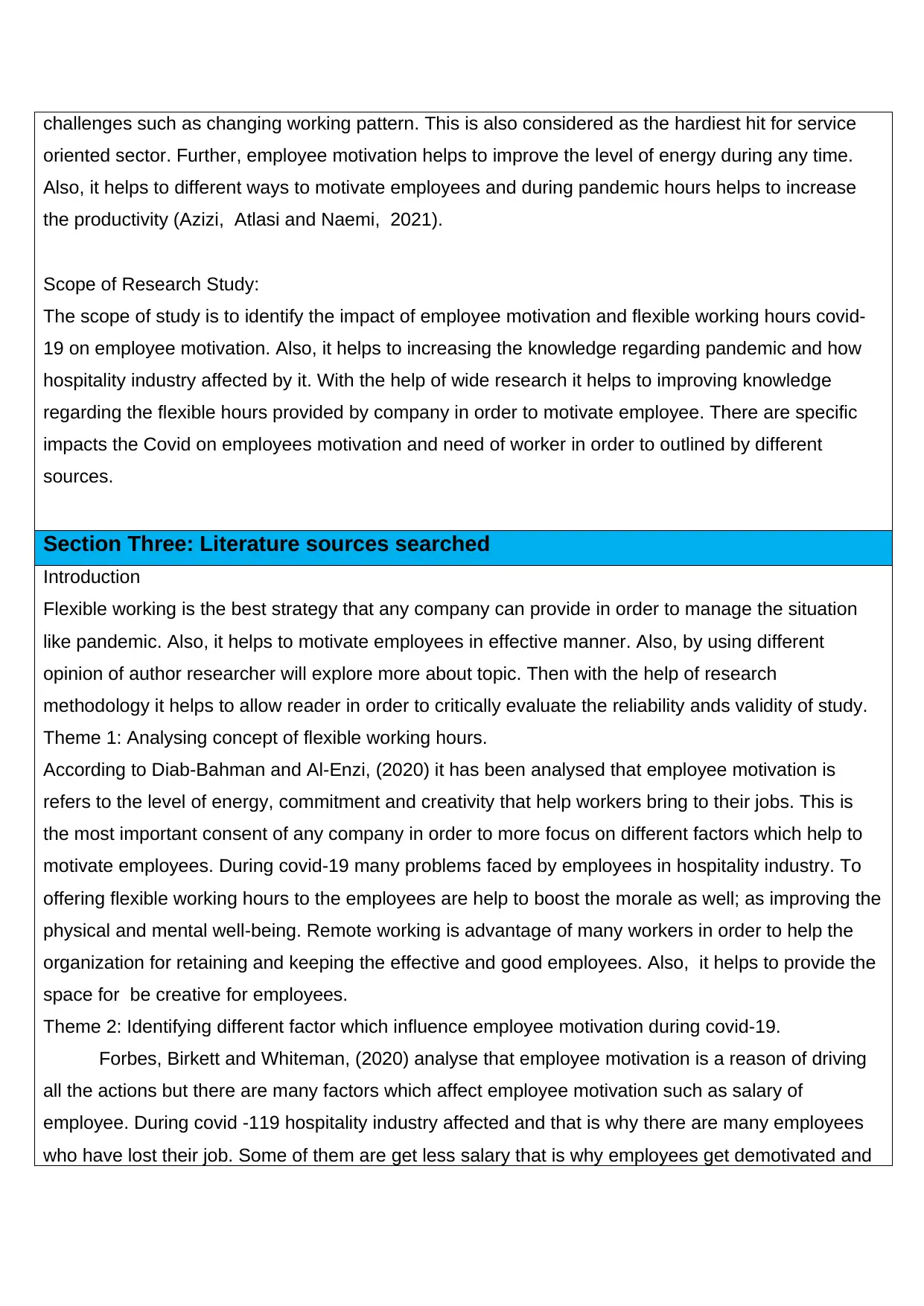
challenges such as changing working pattern. This is also considered as the hardiest hit for service
oriented sector. Further, employee motivation helps to improve the level of energy during any time.
Also, it helps to different ways to motivate employees and during pandemic hours helps to increase
the productivity (Azizi, Atlasi and Naemi, 2021).
Scope of Research Study:
The scope of study is to identify the impact of employee motivation and flexible working hours covid-
19 on employee motivation. Also, it helps to increasing the knowledge regarding pandemic and how
hospitality industry affected by it. With the help of wide research it helps to improving knowledge
regarding the flexible hours provided by company in order to motivate employee. There are specific
impacts the Covid on employees motivation and need of worker in order to outlined by different
sources.
Section Three: Literature sources searched
Introduction
Flexible working is the best strategy that any company can provide in order to manage the situation
like pandemic. Also, it helps to motivate employees in effective manner. Also, by using different
opinion of author researcher will explore more about topic. Then with the help of research
methodology it helps to allow reader in order to critically evaluate the reliability ands validity of study.
Theme 1: Analysing concept of flexible working hours.
According to Diab-Bahman and Al-Enzi, (2020) it has been analysed that employee motivation is
refers to the level of energy, commitment and creativity that help workers bring to their jobs. This is
the most important consent of any company in order to more focus on different factors which help to
motivate employees. During covid-19 many problems faced by employees in hospitality industry. To
offering flexible working hours to the employees are help to boost the morale as well; as improving the
physical and mental well-being. Remote working is advantage of many workers in order to help the
organization for retaining and keeping the effective and good employees. Also, it helps to provide the
space for be creative for employees.
Theme 2: Identifying different factor which influence employee motivation during covid-19.
Forbes, Birkett and Whiteman, (2020) analyse that employee motivation is a reason of driving
all the actions but there are many factors which affect employee motivation such as salary of
employee. During covid -119 hospitality industry affected and that is why there are many employees
who have lost their job. Some of them are get less salary that is why employees get demotivated and
oriented sector. Further, employee motivation helps to improve the level of energy during any time.
Also, it helps to different ways to motivate employees and during pandemic hours helps to increase
the productivity (Azizi, Atlasi and Naemi, 2021).
Scope of Research Study:
The scope of study is to identify the impact of employee motivation and flexible working hours covid-
19 on employee motivation. Also, it helps to increasing the knowledge regarding pandemic and how
hospitality industry affected by it. With the help of wide research it helps to improving knowledge
regarding the flexible hours provided by company in order to motivate employee. There are specific
impacts the Covid on employees motivation and need of worker in order to outlined by different
sources.
Section Three: Literature sources searched
Introduction
Flexible working is the best strategy that any company can provide in order to manage the situation
like pandemic. Also, it helps to motivate employees in effective manner. Also, by using different
opinion of author researcher will explore more about topic. Then with the help of research
methodology it helps to allow reader in order to critically evaluate the reliability ands validity of study.
Theme 1: Analysing concept of flexible working hours.
According to Diab-Bahman and Al-Enzi, (2020) it has been analysed that employee motivation is
refers to the level of energy, commitment and creativity that help workers bring to their jobs. This is
the most important consent of any company in order to more focus on different factors which help to
motivate employees. During covid-19 many problems faced by employees in hospitality industry. To
offering flexible working hours to the employees are help to boost the morale as well; as improving the
physical and mental well-being. Remote working is advantage of many workers in order to help the
organization for retaining and keeping the effective and good employees. Also, it helps to provide the
space for be creative for employees.
Theme 2: Identifying different factor which influence employee motivation during covid-19.
Forbes, Birkett and Whiteman, (2020) analyse that employee motivation is a reason of driving
all the actions but there are many factors which affect employee motivation such as salary of
employee. During covid -119 hospitality industry affected and that is why there are many employees
who have lost their job. Some of them are get less salary that is why employees get demotivated and
⊘ This is a preview!⊘
Do you want full access?
Subscribe today to unlock all pages.

Trusted by 1+ million students worldwide
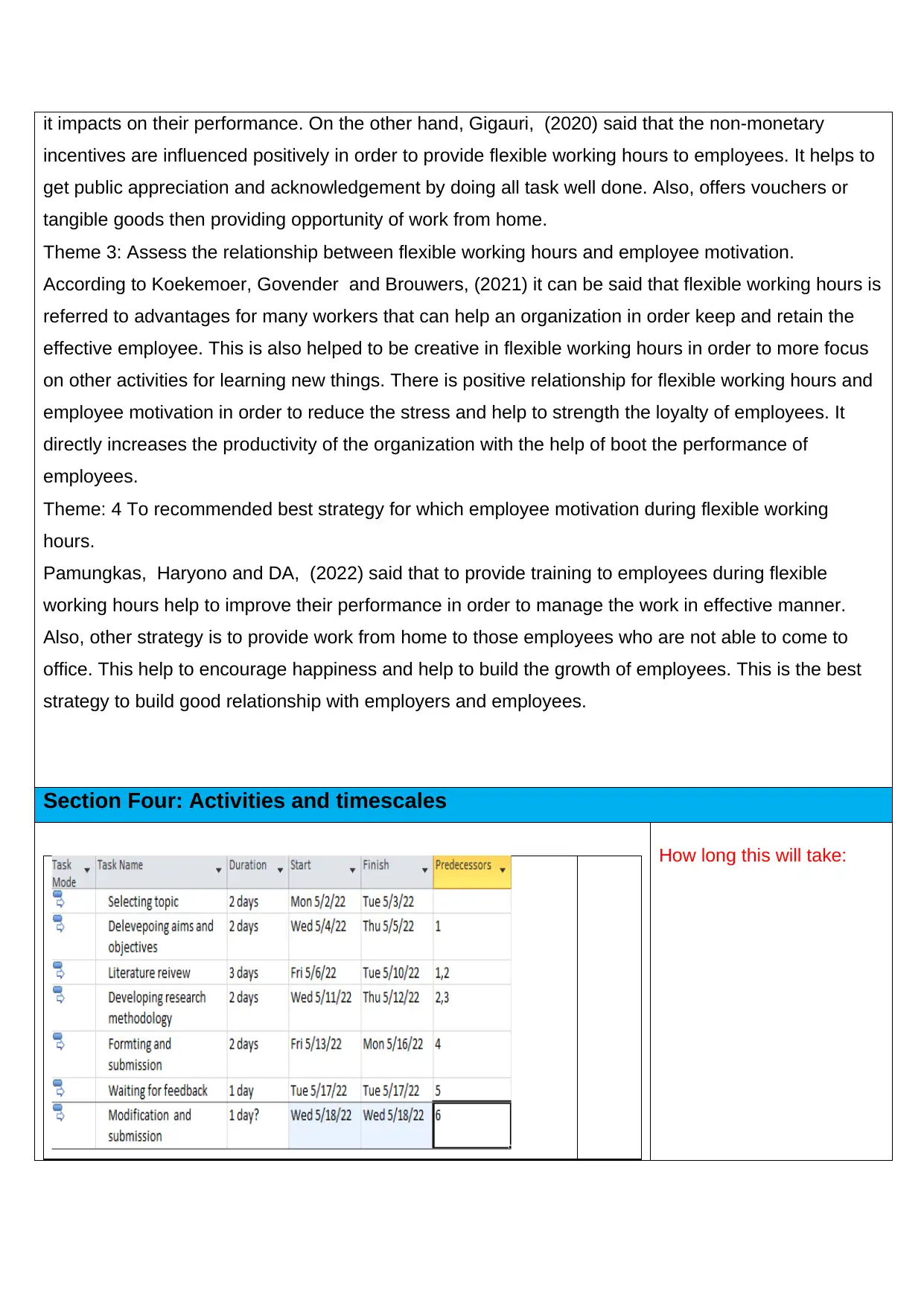
it impacts on their performance. On the other hand, Gigauri, (2020) said that the non-monetary
incentives are influenced positively in order to provide flexible working hours to employees. It helps to
get public appreciation and acknowledgement by doing all task well done. Also, offers vouchers or
tangible goods then providing opportunity of work from home.
Theme 3: Assess the relationship between flexible working hours and employee motivation.
According to Koekemoer, Govender and Brouwers, (2021) it can be said that flexible working hours is
referred to advantages for many workers that can help an organization in order keep and retain the
effective employee. This is also helped to be creative in flexible working hours in order to more focus
on other activities for learning new things. There is positive relationship for flexible working hours and
employee motivation in order to reduce the stress and help to strength the loyalty of employees. It
directly increases the productivity of the organization with the help of boot the performance of
employees.
Theme: 4 To recommended best strategy for which employee motivation during flexible working
hours.
Pamungkas, Haryono and DA, (2022) said that to provide training to employees during flexible
working hours help to improve their performance in order to manage the work in effective manner.
Also, other strategy is to provide work from home to those employees who are not able to come to
office. This help to encourage happiness and help to build the growth of employees. This is the best
strategy to build good relationship with employers and employees.
Section Four: Activities and timescales
How long this will take:
incentives are influenced positively in order to provide flexible working hours to employees. It helps to
get public appreciation and acknowledgement by doing all task well done. Also, offers vouchers or
tangible goods then providing opportunity of work from home.
Theme 3: Assess the relationship between flexible working hours and employee motivation.
According to Koekemoer, Govender and Brouwers, (2021) it can be said that flexible working hours is
referred to advantages for many workers that can help an organization in order keep and retain the
effective employee. This is also helped to be creative in flexible working hours in order to more focus
on other activities for learning new things. There is positive relationship for flexible working hours and
employee motivation in order to reduce the stress and help to strength the loyalty of employees. It
directly increases the productivity of the organization with the help of boot the performance of
employees.
Theme: 4 To recommended best strategy for which employee motivation during flexible working
hours.
Pamungkas, Haryono and DA, (2022) said that to provide training to employees during flexible
working hours help to improve their performance in order to manage the work in effective manner.
Also, other strategy is to provide work from home to those employees who are not able to come to
office. This help to encourage happiness and help to build the growth of employees. This is the best
strategy to build good relationship with employers and employees.
Section Four: Activities and timescales
How long this will take:
Paraphrase This Document
Need a fresh take? Get an instant paraphrase of this document with our AI Paraphraser
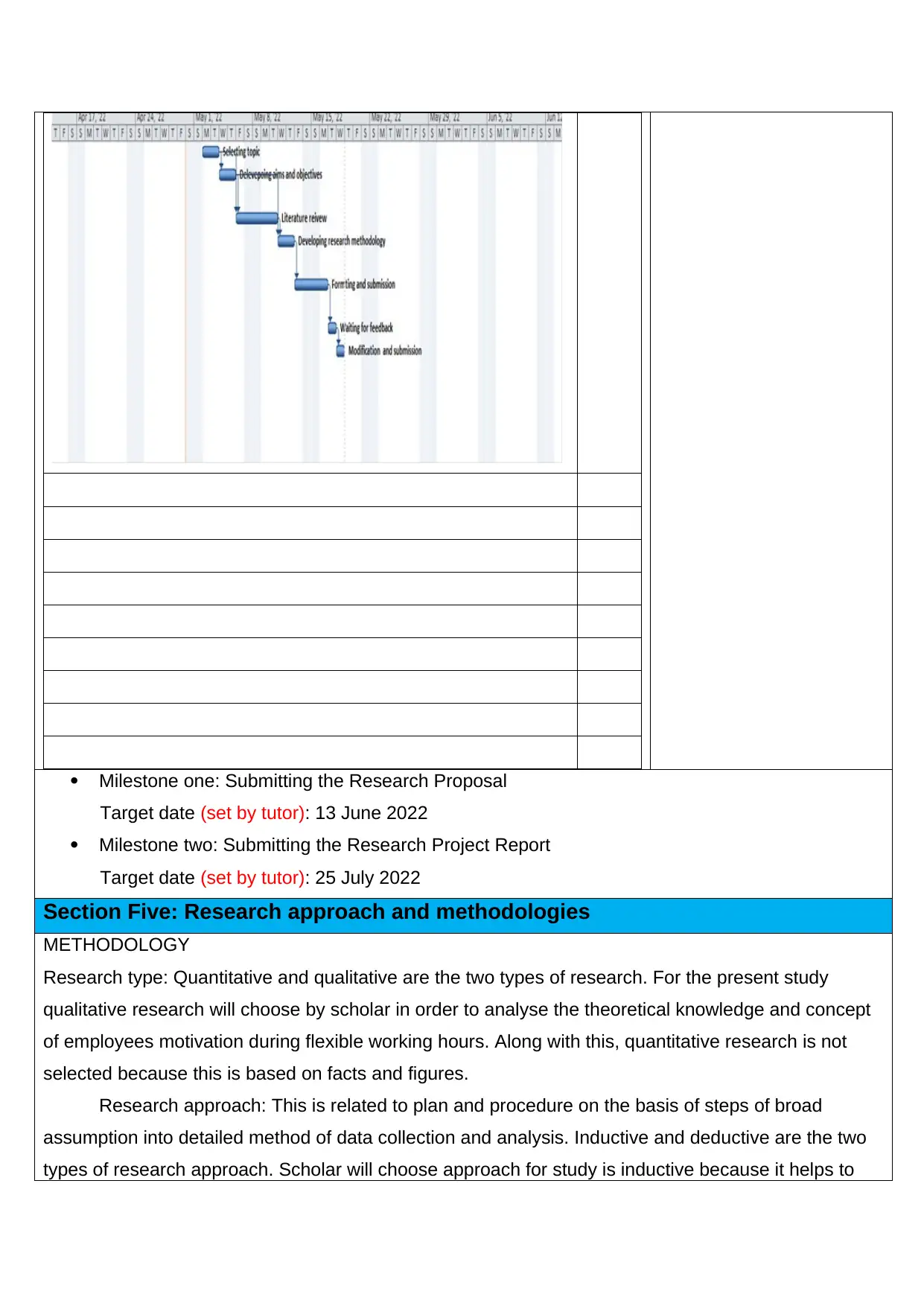
Milestone one: Submitting the Research Proposal
Target date (set by tutor): 13 June 2022
Milestone two: Submitting the Research Project Report
Target date (set by tutor): 25 July 2022
Section Five: Research approach and methodologies
METHODOLOGY
Research type: Quantitative and qualitative are the two types of research. For the present study
qualitative research will choose by scholar in order to analyse the theoretical knowledge and concept
of employees motivation during flexible working hours. Along with this, quantitative research is not
selected because this is based on facts and figures.
Research approach: This is related to plan and procedure on the basis of steps of broad
assumption into detailed method of data collection and analysis. Inductive and deductive are the two
types of research approach. Scholar will choose approach for study is inductive because it helps to
Target date (set by tutor): 13 June 2022
Milestone two: Submitting the Research Project Report
Target date (set by tutor): 25 July 2022
Section Five: Research approach and methodologies
METHODOLOGY
Research type: Quantitative and qualitative are the two types of research. For the present study
qualitative research will choose by scholar in order to analyse the theoretical knowledge and concept
of employees motivation during flexible working hours. Along with this, quantitative research is not
selected because this is based on facts and figures.
Research approach: This is related to plan and procedure on the basis of steps of broad
assumption into detailed method of data collection and analysis. Inductive and deductive are the two
types of research approach. Scholar will choose approach for study is inductive because it helps to
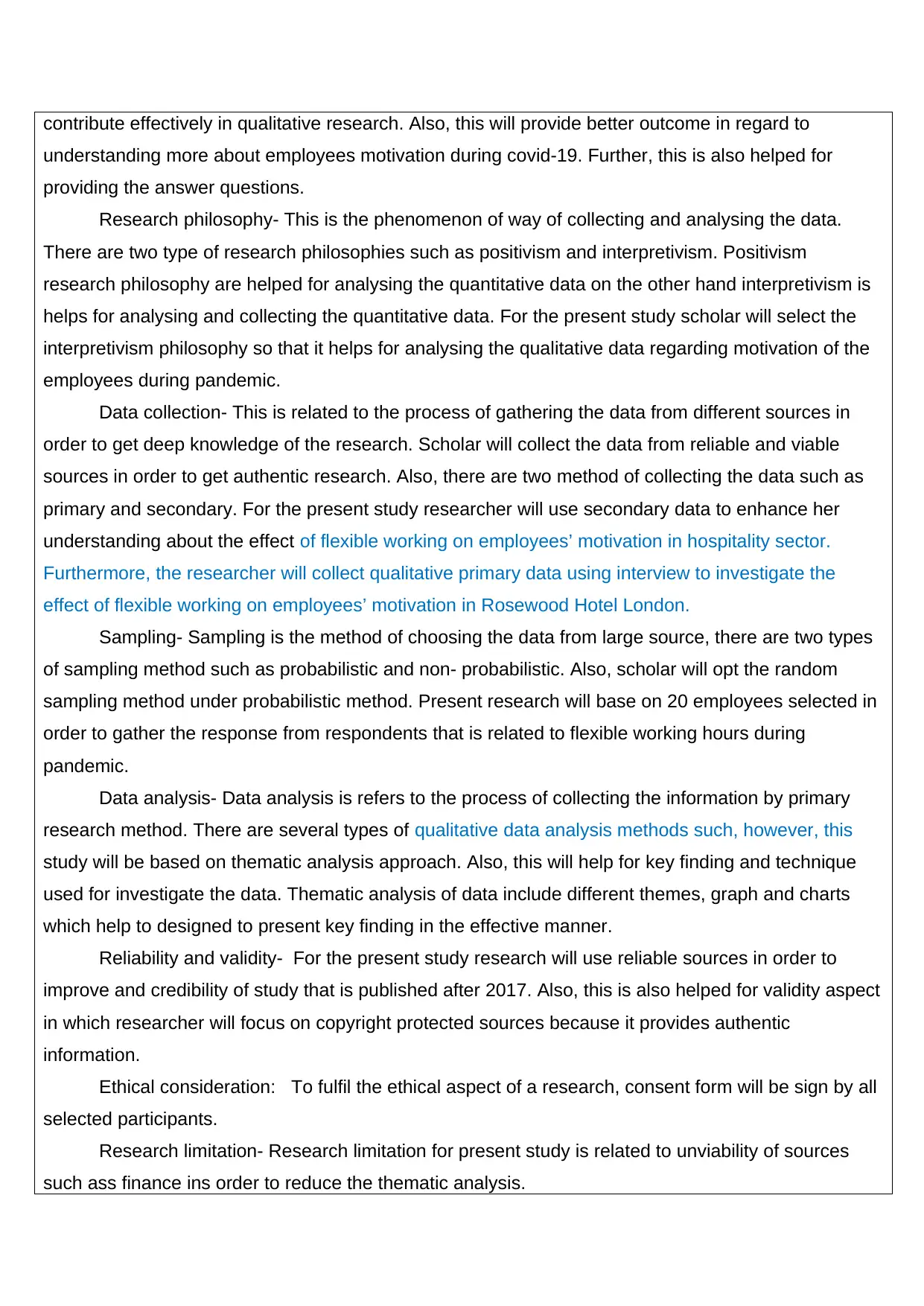
contribute effectively in qualitative research. Also, this will provide better outcome in regard to
understanding more about employees motivation during covid-19. Further, this is also helped for
providing the answer questions.
Research philosophy- This is the phenomenon of way of collecting and analysing the data.
There are two type of research philosophies such as positivism and interpretivism. Positivism
research philosophy are helped for analysing the quantitative data on the other hand interpretivism is
helps for analysing and collecting the quantitative data. For the present study scholar will select the
interpretivism philosophy so that it helps for analysing the qualitative data regarding motivation of the
employees during pandemic.
Data collection- This is related to the process of gathering the data from different sources in
order to get deep knowledge of the research. Scholar will collect the data from reliable and viable
sources in order to get authentic research. Also, there are two method of collecting the data such as
primary and secondary. For the present study researcher will use secondary data to enhance her
understanding about the effect of flexible working on employees’ motivation in hospitality sector.
Furthermore, the researcher will collect qualitative primary data using interview to investigate the
effect of flexible working on employees’ motivation in Rosewood Hotel London.
Sampling- Sampling is the method of choosing the data from large source, there are two types
of sampling method such as probabilistic and non- probabilistic. Also, scholar will opt the random
sampling method under probabilistic method. Present research will base on 20 employees selected in
order to gather the response from respondents that is related to flexible working hours during
pandemic.
Data analysis- Data analysis is refers to the process of collecting the information by primary
research method. There are several types of qualitative data analysis methods such, however, this
study will be based on thematic analysis approach. Also, this will help for key finding and technique
used for investigate the data. Thematic analysis of data include different themes, graph and charts
which help to designed to present key finding in the effective manner.
Reliability and validity- For the present study research will use reliable sources in order to
improve and credibility of study that is published after 2017. Also, this is also helped for validity aspect
in which researcher will focus on copyright protected sources because it provides authentic
information.
Ethical consideration: To fulfil the ethical aspect of a research, consent form will be sign by all
selected participants.
Research limitation- Research limitation for present study is related to unviability of sources
such ass finance ins order to reduce the thematic analysis.
understanding more about employees motivation during covid-19. Further, this is also helped for
providing the answer questions.
Research philosophy- This is the phenomenon of way of collecting and analysing the data.
There are two type of research philosophies such as positivism and interpretivism. Positivism
research philosophy are helped for analysing the quantitative data on the other hand interpretivism is
helps for analysing and collecting the quantitative data. For the present study scholar will select the
interpretivism philosophy so that it helps for analysing the qualitative data regarding motivation of the
employees during pandemic.
Data collection- This is related to the process of gathering the data from different sources in
order to get deep knowledge of the research. Scholar will collect the data from reliable and viable
sources in order to get authentic research. Also, there are two method of collecting the data such as
primary and secondary. For the present study researcher will use secondary data to enhance her
understanding about the effect of flexible working on employees’ motivation in hospitality sector.
Furthermore, the researcher will collect qualitative primary data using interview to investigate the
effect of flexible working on employees’ motivation in Rosewood Hotel London.
Sampling- Sampling is the method of choosing the data from large source, there are two types
of sampling method such as probabilistic and non- probabilistic. Also, scholar will opt the random
sampling method under probabilistic method. Present research will base on 20 employees selected in
order to gather the response from respondents that is related to flexible working hours during
pandemic.
Data analysis- Data analysis is refers to the process of collecting the information by primary
research method. There are several types of qualitative data analysis methods such, however, this
study will be based on thematic analysis approach. Also, this will help for key finding and technique
used for investigate the data. Thematic analysis of data include different themes, graph and charts
which help to designed to present key finding in the effective manner.
Reliability and validity- For the present study research will use reliable sources in order to
improve and credibility of study that is published after 2017. Also, this is also helped for validity aspect
in which researcher will focus on copyright protected sources because it provides authentic
information.
Ethical consideration: To fulfil the ethical aspect of a research, consent form will be sign by all
selected participants.
Research limitation- Research limitation for present study is related to unviability of sources
such ass finance ins order to reduce the thematic analysis.
⊘ This is a preview!⊘
Do you want full access?
Subscribe today to unlock all pages.

Trusted by 1+ million students worldwide
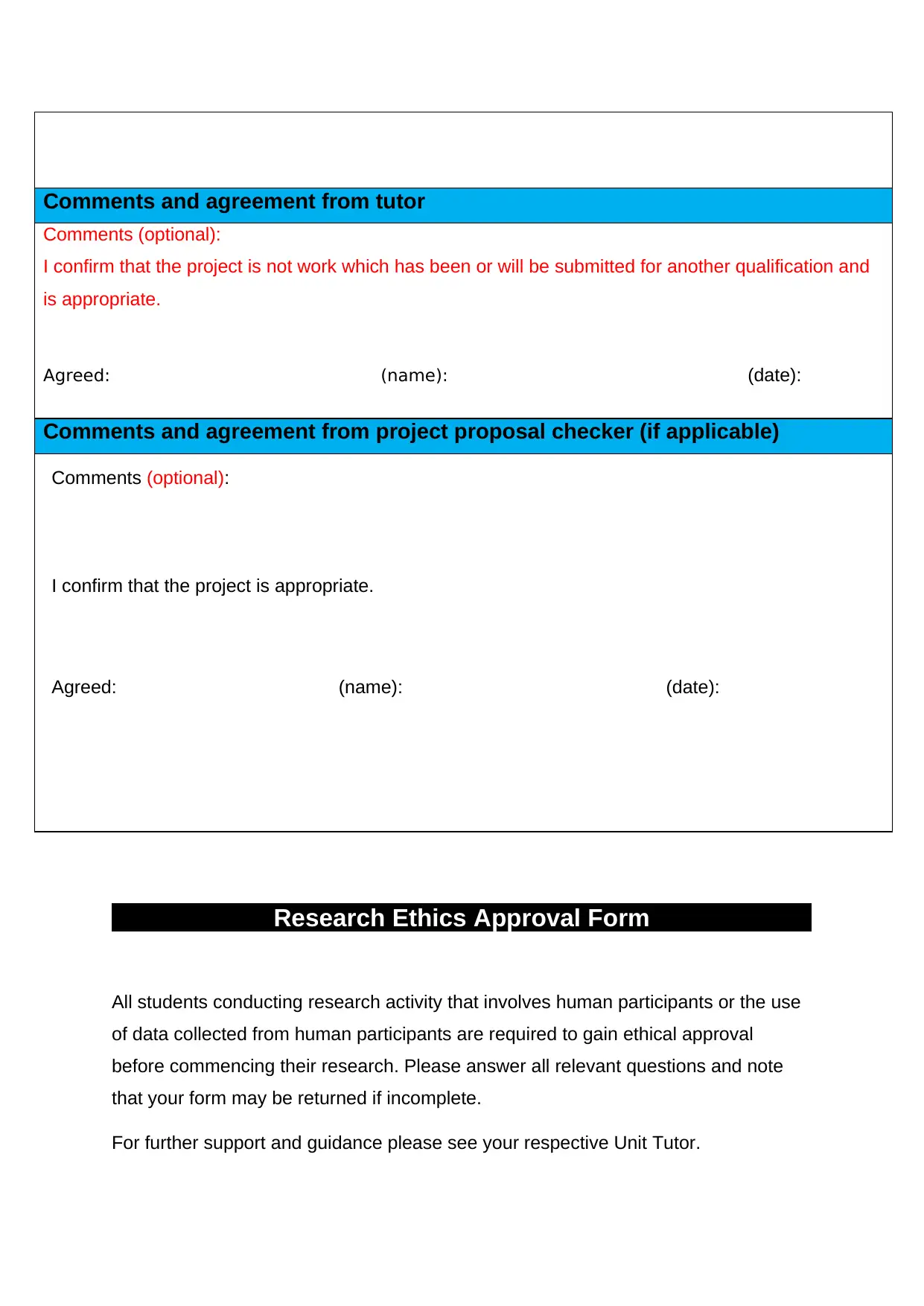
Comments and agreement from tutor
Comments (optional):
I confirm that the project is not work which has been or will be submitted for another qualification and
is appropriate.
Agreed: (name): (date):
Comments and agreement from project proposal checker (if applicable)
Comments (optional):
I confirm that the project is appropriate.
Agreed: (name): (date):
Research Ethics Approval Form
All students conducting research activity that involves human participants or the use
of data collected from human participants are required to gain ethical approval
before commencing their research. Please answer all relevant questions and note
that your form may be returned if incomplete.
For further support and guidance please see your respective Unit Tutor.
Comments (optional):
I confirm that the project is not work which has been or will be submitted for another qualification and
is appropriate.
Agreed: (name): (date):
Comments and agreement from project proposal checker (if applicable)
Comments (optional):
I confirm that the project is appropriate.
Agreed: (name): (date):
Research Ethics Approval Form
All students conducting research activity that involves human participants or the use
of data collected from human participants are required to gain ethical approval
before commencing their research. Please answer all relevant questions and note
that your form may be returned if incomplete.
For further support and guidance please see your respective Unit Tutor.
Paraphrase This Document
Need a fresh take? Get an instant paraphrase of this document with our AI Paraphraser
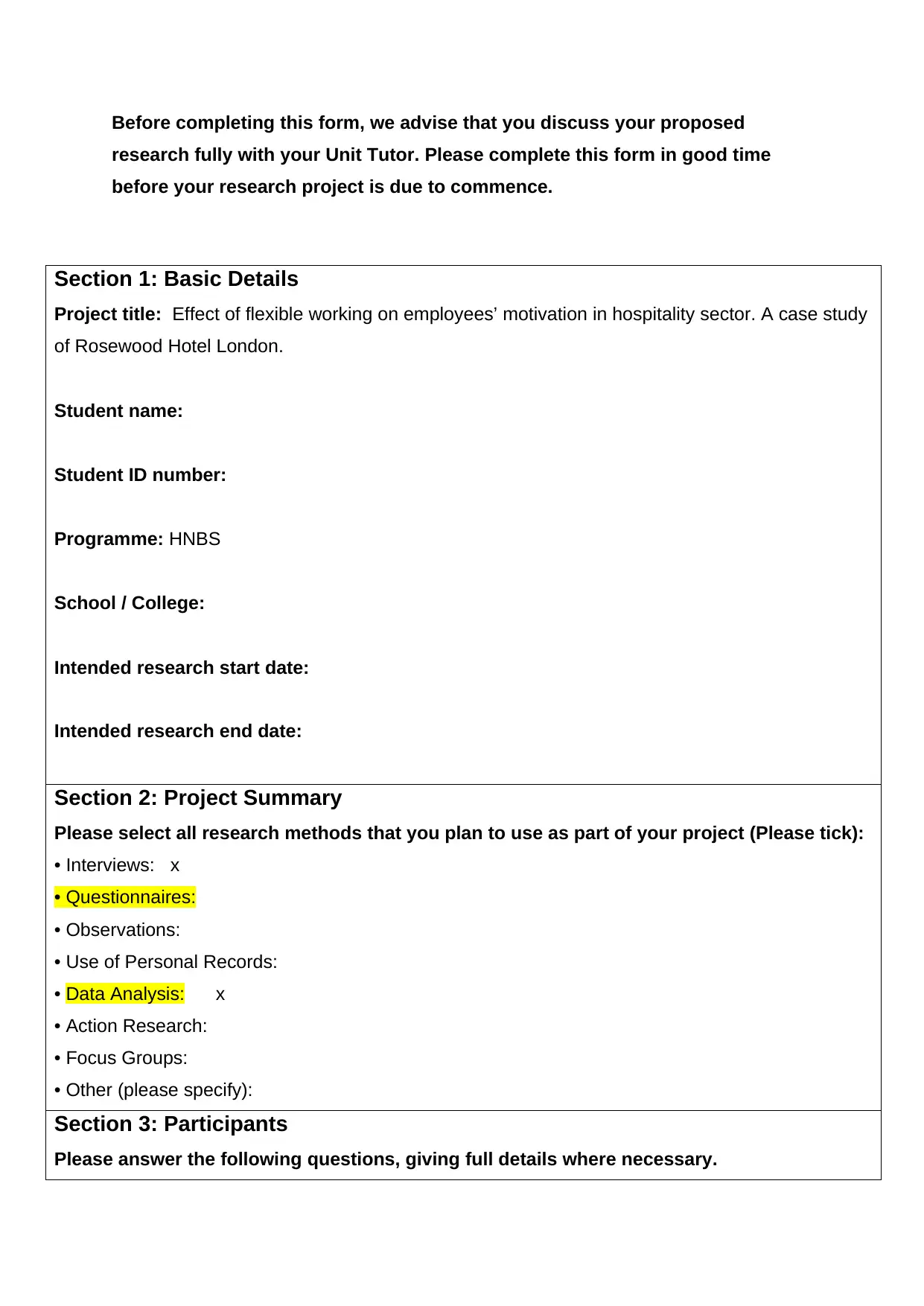
Before completing this form, we advise that you discuss your proposed
research fully with your Unit Tutor. Please complete this form in good time
before your research project is due to commence.
Section 1: Basic Details
Project title: Effect of flexible working on employees’ motivation in hospitality sector. A case study
of Rosewood Hotel London.
Student name:
Student ID number:
Programme: HNBS
School / College:
Intended research start date:
Intended research end date:
Section 2: Project Summary
Please select all research methods that you plan to use as part of your project (Please tick):
• Interviews: x
• Questionnaires:
• Observations:
• Use of Personal Records:
• Data Analysis: x
• Action Research:
• Focus Groups:
• Other (please specify):
Section 3: Participants
Please answer the following questions, giving full details where necessary.
research fully with your Unit Tutor. Please complete this form in good time
before your research project is due to commence.
Section 1: Basic Details
Project title: Effect of flexible working on employees’ motivation in hospitality sector. A case study
of Rosewood Hotel London.
Student name:
Student ID number:
Programme: HNBS
School / College:
Intended research start date:
Intended research end date:
Section 2: Project Summary
Please select all research methods that you plan to use as part of your project (Please tick):
• Interviews: x
• Questionnaires:
• Observations:
• Use of Personal Records:
• Data Analysis: x
• Action Research:
• Focus Groups:
• Other (please specify):
Section 3: Participants
Please answer the following questions, giving full details where necessary.
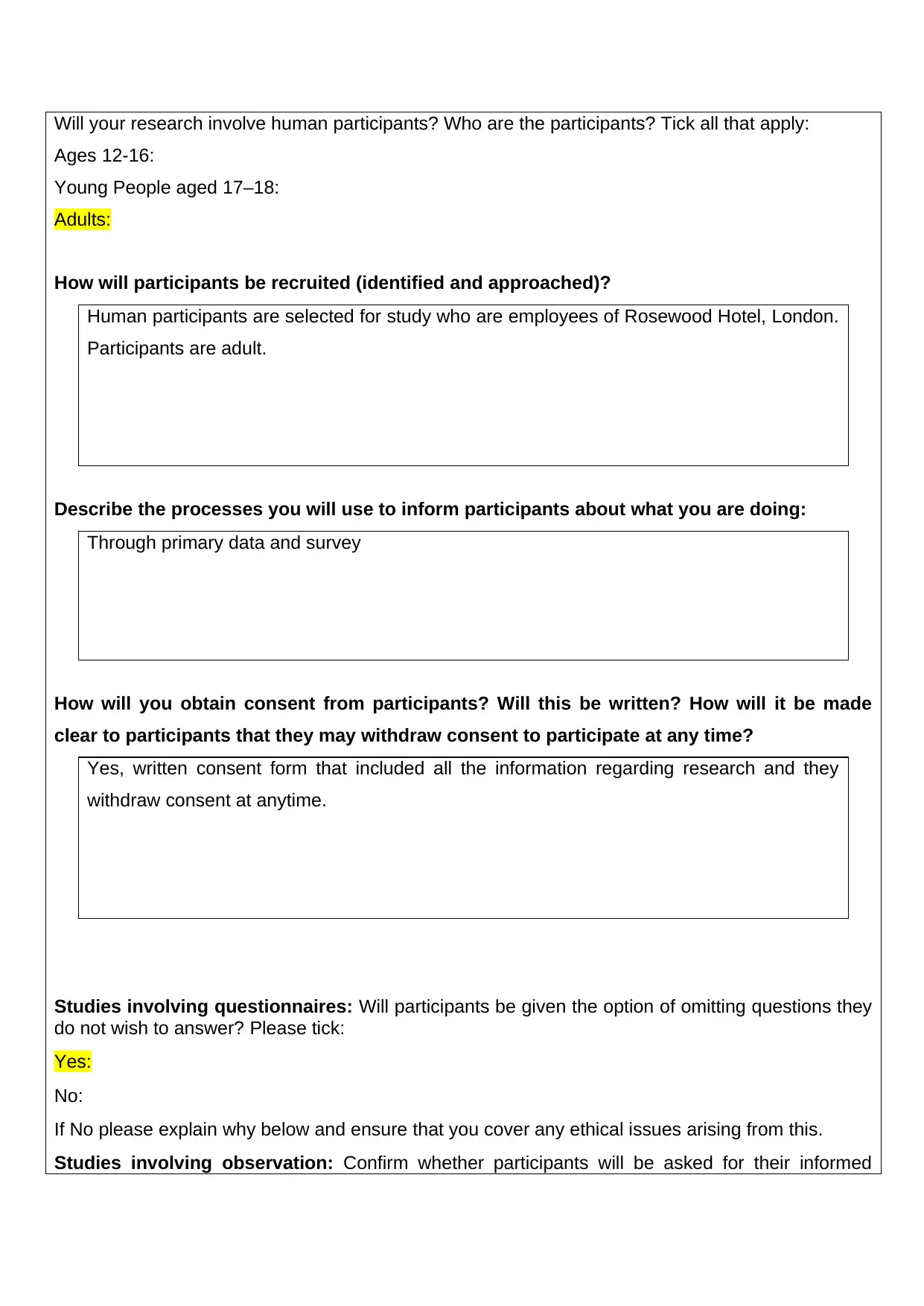
Will your research involve human participants? Who are the participants? Tick all that apply:
Ages 12-16:
Young People aged 17–18:
Adults:
How will participants be recruited (identified and approached)?
Human participants are selected for study who are employees of Rosewood Hotel, London.
Participants are adult.
Describe the processes you will use to inform participants about what you are doing:
Through primary data and survey
How will you obtain consent from participants? Will this be written? How will it be made
clear to participants that they may withdraw consent to participate at any time?
Yes, written consent form that included all the information regarding research and they
withdraw consent at anytime.
Studies involving questionnaires: Will participants be given the option of omitting questions they
do not wish to answer? Please tick:
Yes:
No:
If No please explain why below and ensure that you cover any ethical issues arising from this.
Studies involving observation: Confirm whether participants will be asked for their informed
Ages 12-16:
Young People aged 17–18:
Adults:
How will participants be recruited (identified and approached)?
Human participants are selected for study who are employees of Rosewood Hotel, London.
Participants are adult.
Describe the processes you will use to inform participants about what you are doing:
Through primary data and survey
How will you obtain consent from participants? Will this be written? How will it be made
clear to participants that they may withdraw consent to participate at any time?
Yes, written consent form that included all the information regarding research and they
withdraw consent at anytime.
Studies involving questionnaires: Will participants be given the option of omitting questions they
do not wish to answer? Please tick:
Yes:
No:
If No please explain why below and ensure that you cover any ethical issues arising from this.
Studies involving observation: Confirm whether participants will be asked for their informed
⊘ This is a preview!⊘
Do you want full access?
Subscribe today to unlock all pages.

Trusted by 1+ million students worldwide
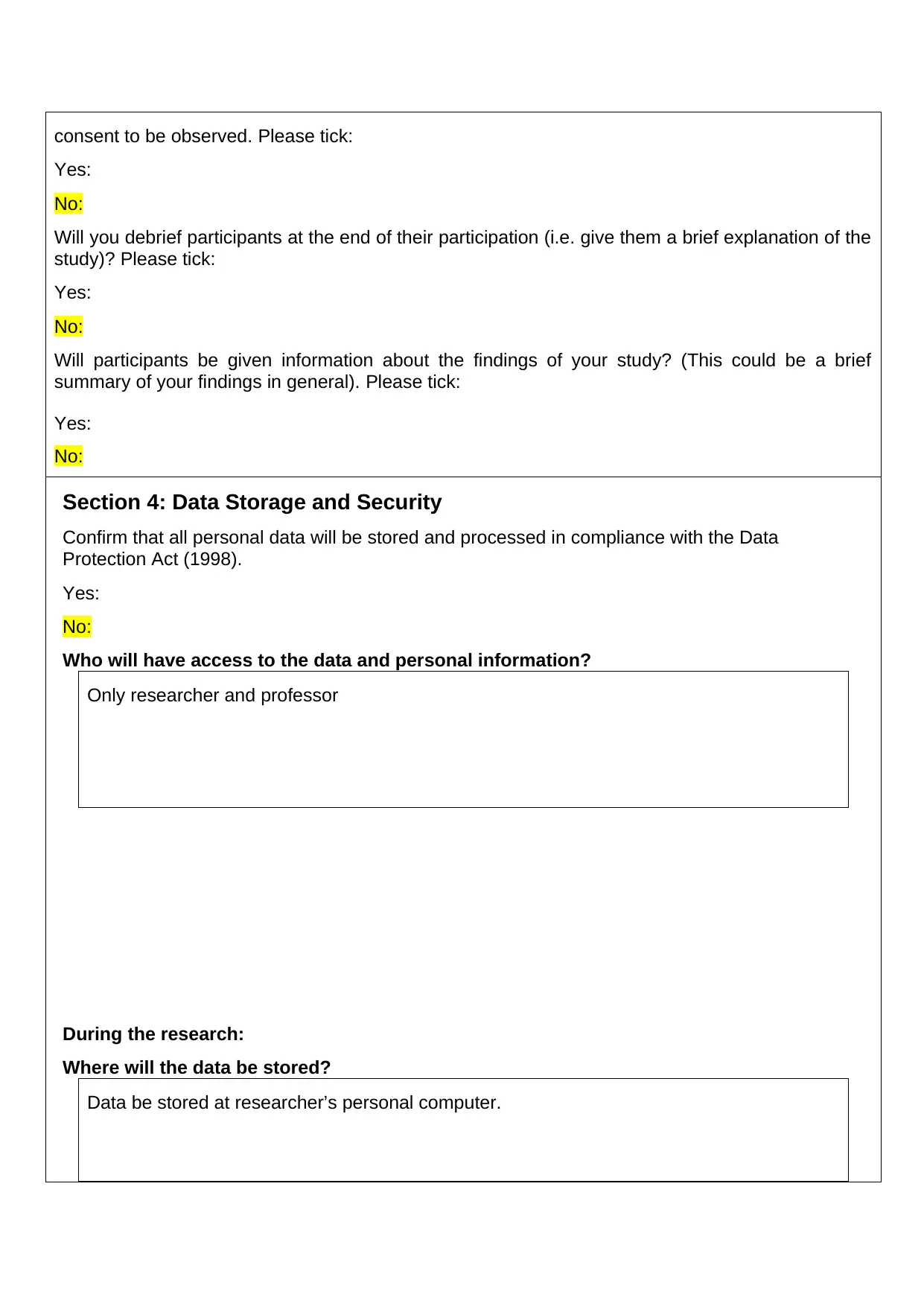
consent to be observed. Please tick:
Yes:
No:
Will you debrief participants at the end of their participation (i.e. give them a brief explanation of the
study)? Please tick:
Yes:
No:
Will participants be given information about the findings of your study? (This could be a brief
summary of your findings in general). Please tick:
Yes:
No:
Section 4: Data Storage and Security
Confirm that all personal data will be stored and processed in compliance with the Data
Protection Act (1998).
Yes:
No:
Who will have access to the data and personal information?
Only researcher and professor
During the research:
Where will the data be stored?
Data be stored at researcher’s personal computer.
Yes:
No:
Will you debrief participants at the end of their participation (i.e. give them a brief explanation of the
study)? Please tick:
Yes:
No:
Will participants be given information about the findings of your study? (This could be a brief
summary of your findings in general). Please tick:
Yes:
No:
Section 4: Data Storage and Security
Confirm that all personal data will be stored and processed in compliance with the Data
Protection Act (1998).
Yes:
No:
Who will have access to the data and personal information?
Only researcher and professor
During the research:
Where will the data be stored?
Data be stored at researcher’s personal computer.
Paraphrase This Document
Need a fresh take? Get an instant paraphrase of this document with our AI Paraphraser
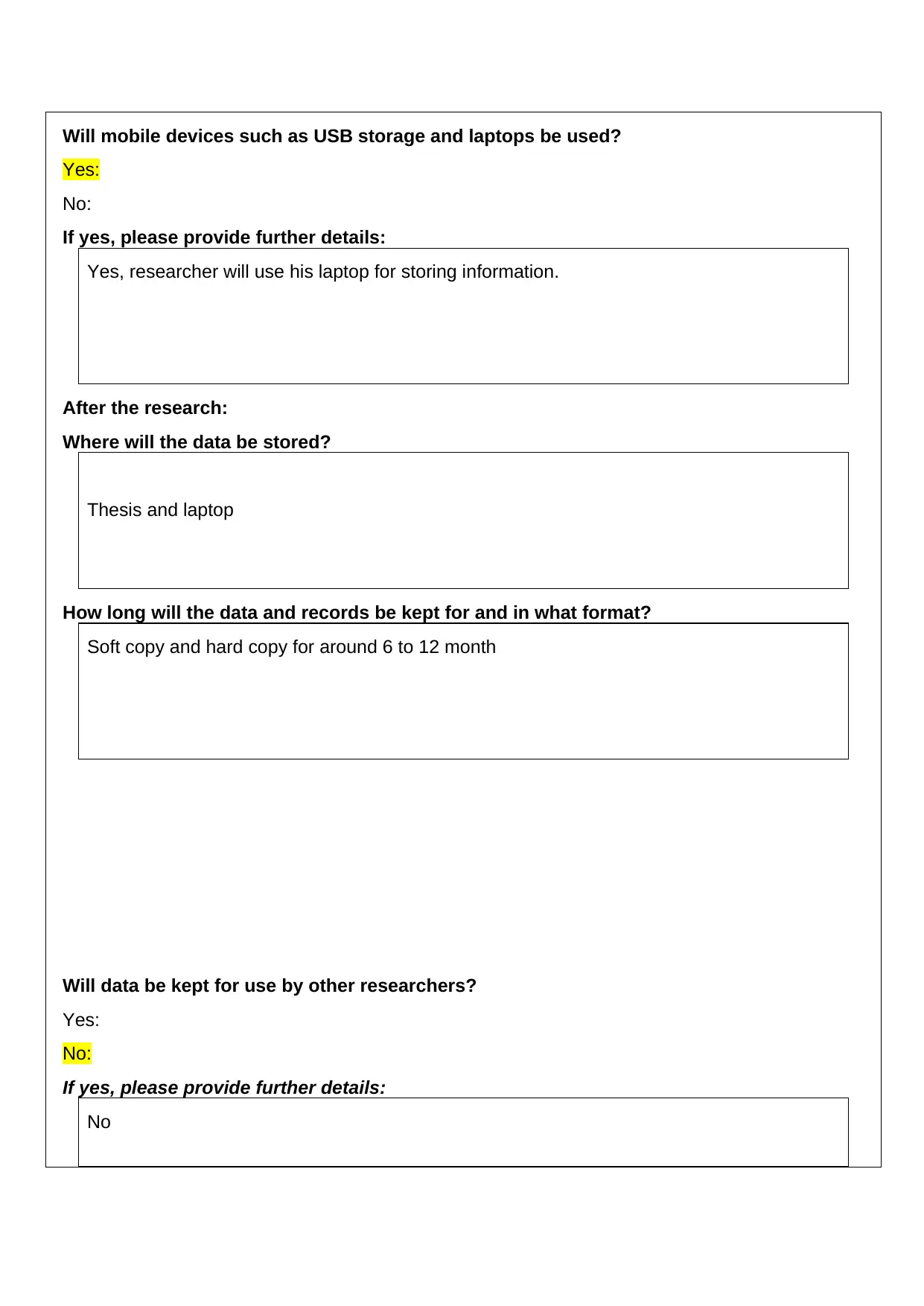
Will mobile devices such as USB storage and laptops be used?
Yes:
No:
If yes, please provide further details:
Yes, researcher will use his laptop for storing information.
After the research:
Where will the data be stored?
Thesis and laptop
How long will the data and records be kept for and in what format?
Soft copy and hard copy for around 6 to 12 month
Will data be kept for use by other researchers?
Yes:
No:
If yes, please provide further details:
No
Yes:
No:
If yes, please provide further details:
Yes, researcher will use his laptop for storing information.
After the research:
Where will the data be stored?
Thesis and laptop
How long will the data and records be kept for and in what format?
Soft copy and hard copy for around 6 to 12 month
Will data be kept for use by other researchers?
Yes:
No:
If yes, please provide further details:
No
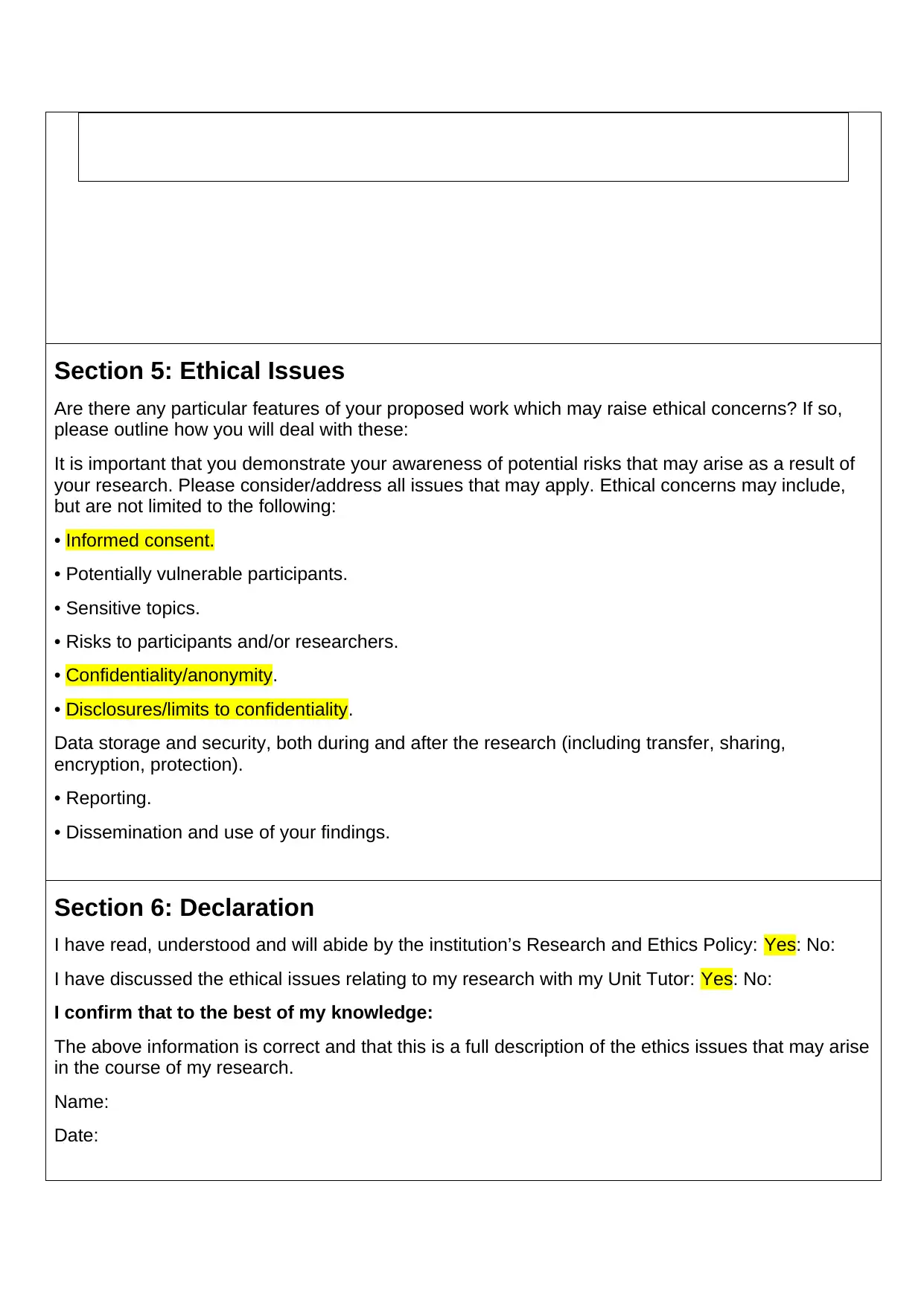
Section 5: Ethical Issues
Are there any particular features of your proposed work which may raise ethical concerns? If so,
please outline how you will deal with these:
It is important that you demonstrate your awareness of potential risks that may arise as a result of
your research. Please consider/address all issues that may apply. Ethical concerns may include,
but are not limited to the following:
• Informed consent.
• Potentially vulnerable participants.
• Sensitive topics.
• Risks to participants and/or researchers.
• Confidentiality/anonymity.
• Disclosures/limits to confidentiality.
Data storage and security, both during and after the research (including transfer, sharing,
encryption, protection).
• Reporting.
• Dissemination and use of your findings.
Section 6: Declaration
I have read, understood and will abide by the institution’s Research and Ethics Policy: Yes: No:
I have discussed the ethical issues relating to my research with my Unit Tutor: Yes: No:
I confirm that to the best of my knowledge:
The above information is correct and that this is a full description of the ethics issues that may arise
in the course of my research.
Name:
Date:
Are there any particular features of your proposed work which may raise ethical concerns? If so,
please outline how you will deal with these:
It is important that you demonstrate your awareness of potential risks that may arise as a result of
your research. Please consider/address all issues that may apply. Ethical concerns may include,
but are not limited to the following:
• Informed consent.
• Potentially vulnerable participants.
• Sensitive topics.
• Risks to participants and/or researchers.
• Confidentiality/anonymity.
• Disclosures/limits to confidentiality.
Data storage and security, both during and after the research (including transfer, sharing,
encryption, protection).
• Reporting.
• Dissemination and use of your findings.
Section 6: Declaration
I have read, understood and will abide by the institution’s Research and Ethics Policy: Yes: No:
I have discussed the ethical issues relating to my research with my Unit Tutor: Yes: No:
I confirm that to the best of my knowledge:
The above information is correct and that this is a full description of the ethics issues that may arise
in the course of my research.
Name:
Date:
⊘ This is a preview!⊘
Do you want full access?
Subscribe today to unlock all pages.

Trusted by 1+ million students worldwide
1 out of 13
Related Documents
Your All-in-One AI-Powered Toolkit for Academic Success.
+13062052269
info@desklib.com
Available 24*7 on WhatsApp / Email
![[object Object]](/_next/static/media/star-bottom.7253800d.svg)
Unlock your academic potential
Copyright © 2020–2026 A2Z Services. All Rights Reserved. Developed and managed by ZUCOL.





